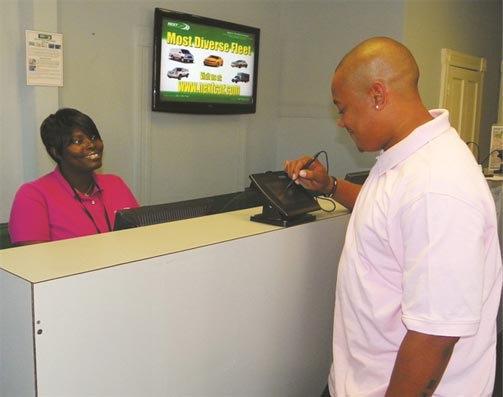Understanding E-Signature Pads and the Electronic Rental Agreement

It’s easy to understand the trend toward electronic agreements signed using electronic signature pads — they provide benefits to both the customer and the rental company, including administrative savings, shorter processing times and a reduction in paper files.
The electronic rental agreement is simply a version of the manual rental agreement in electronic form. Nonetheless, this added layer of technology can add new wrinkles to the age-old customer argument of “I didn’t agree to that,” as this recent class-action lawsuit brought against Dollar Thrifty Automotive Group (DTAG) attests.
FACING CLASS-ACTION CLAIMS
Accused of adding extra charges onto rental car contracts and violating consumer protection statutes, DTAG (acquired by Hertz in late 2012) is facing class-action claims from customers that could advance to trial. According to the McKinnon and Tool v. Dollar Thrifty Automotive Group case filed on Aug. 24, 2012, Sandra McKinnon and Kirsten Tool are suing for allegedly defrauding them and other customers in California and Oklahoma.
“Plaintiffs suggest that defendants rely on the hustle and rush of airports to send their customers away without having reviewed their rental charges, thereby giving defendants a basis for claiming that their customers routinely agree to the add-on charges,” according to the opinion written by U.S. District Judge Samuel Conti.
After allegedly orally declining additional services such as damage waivers and insurance, the plaintiffs claim that Dollar employees misled them into checking boxes on the electronic signature pad that actually added the extra services.
Because the rental agent allegedly didn’t verbally discuss the total amount charged at pickup with McKinnon, the complaint claims that McKinnon was charged $359.65 in addition to her original online reservation rate when she returned the car, according to the McKinnon opinion.
On July 3, the U.S. District Court for the Northern District of California refused to dismiss all the class-action claims against DTAG.
“Based on plaintiffs’ reasonably specific pleadings, defendants have a national scheme involving providing low reservation rates and then tricking customers into paying more once they pick up their cars,” according to Conti’s opinion. “… Defendants’ conduct is more than mere endemic dishonesty — it is actionable under the unfair competition law as an unfair and fraudulent business practice.”
In addition, Conti found that DTAG’s online reservation confirmation should be viewed as a contract: “Defendants’ refusal to honor the confirmation price in anyway, and in fact to convince plaintiffs of the price’s validity and then alter it secretly, was a breach.”
Via: Auto Rental News

